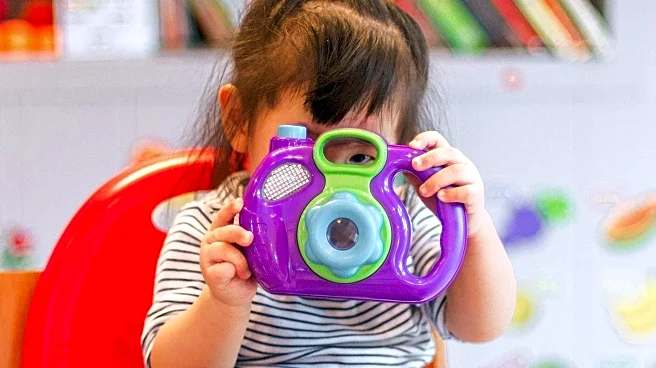What's Happening?
A recent study published in the Journal of Attention Disorders questions the moderate brain arousal model, a leading theory explaining how auditory stimulation affects individuals with attention deficit hyperactivity disorder (ADHD) traits. The research,
conducted by Joske Rijmen and colleagues at Ghent University, found that both random noise, like pink noise, and non-random pure tones have similar effects on brain activity related to neural noise. This contradicts the model's assumptions that ADHD is linked to lower internal neural noise and that random noise enhances cognitive performance through stochastic resonance. The study involved 69 neurotypical adults who underwent electroencephalogram monitoring while exposed to different sound conditions. Results showed that individuals with more ADHD traits had higher baseline neural noise, challenging the model's predictions.
Why It's Important?
This study's findings could significantly impact the understanding and treatment of ADHD. By challenging the moderate brain arousal model, it suggests that the benefits of auditory stimulation may not be due to stochastic resonance but rather a general effect on brain arousal. This could lead to new approaches in managing ADHD symptoms, focusing on regulating arousal levels rather than relying solely on random noise. The research also highlights the need for further studies involving individuals with a formal ADHD diagnosis to validate these findings. If confirmed, this could influence therapeutic practices and the development of interventions aimed at improving cognitive performance in those with ADHD.
What's Next?
Future research is needed to explore these findings in clinical populations with diagnosed ADHD and during tasks requiring attention and focus. Such studies could provide deeper insights into the mechanisms by which auditory stimulation affects brain activity and cognitive performance. Additionally, exploring alternative explanations for the observed effects, such as the state regulation deficit account of ADHD, could lead to more effective treatment strategies. Researchers may also investigate how different types of auditory stimuli can be used to modulate arousal levels in individuals with ADHD, potentially offering new therapeutic options.

















